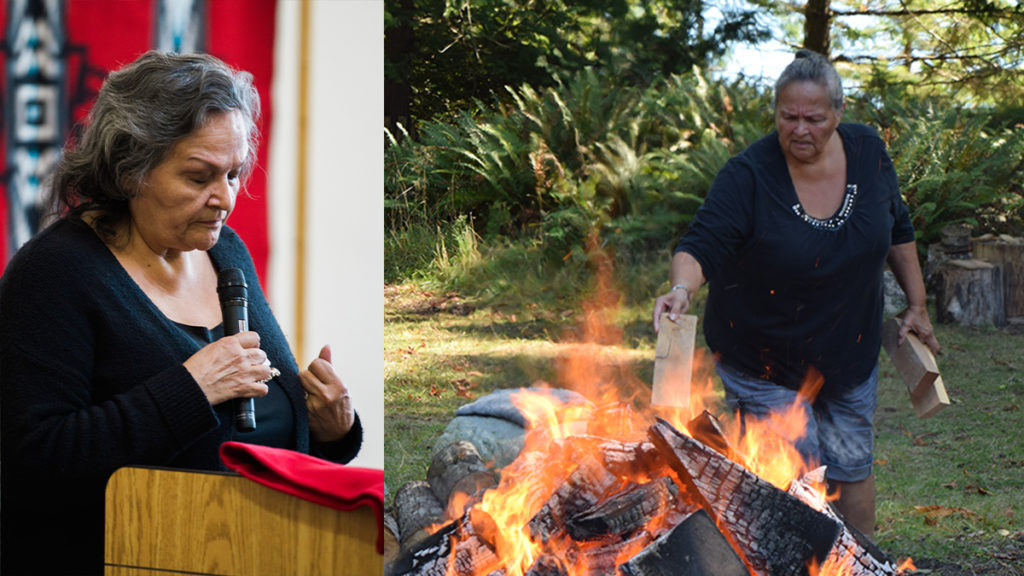This summer Orene Johnston celebrated 10 years with Vancouver Aboriginal Child and Family Services Society in her unique position to help the helpers. She is our Cultural Clinical Counsellor and Elder.
Tell us about your background.
I am an Elder of the Squamish Nation, a mother of daughter Kerrie, son Hitam and a grandmother of granddaughters Lyric, Tuari and Tayan and grandson Savion. I look forward tohaving great grandchildren, as there’s such richness in the multigenerational family connections.
Professionally, I am a Breath Integration Therapist, trained Hands-on-Energy worker, have completed training in Aboriginal-Focused Oriented Therapy and Complex Trauma also have training in Critical Incidence Stress Management. Before coming to VACFSS I worked at the Esemkwu Aboriginal Healing and Wellness Centre in North Vancouver as a therapist for survivors and later generations of residential schools.
We are lucky to have you as part of the VACFSS team for 10 years! How did you come to work here?
After working for 5 years at Esemkwu Aboriginal Healing and Wellness Centre, the centre closed because funding ended. I had to decide what to do next. I knew I wanted to continue working to help Indigenous communities. I followed the advice I give to a lot of people I counsel: “you have to put out into the universe what you want in your life, you will invite it into your life.” I spent some time intentionally inviting more opportunities to do healing work in the Indigenous community, and that’s when the position at VACFSS came up.
Bernadette Spence (VACFSS CEO) had been advocating for traditional cultural support for VACFSS staff and that’s how the position of counsellor/Elder was created. At the time, it was the first of its kind in family services agencies –ahead of what other agencies were doing to incorporate traditional knowledge into counseling work. She told me about the position so I applied for it.
What does your role include?
I am here to provide emotional, physical, mental and spiritual support for all members of VACFSS staff. When I first started, I only worked one day a week and it was just at the Child Protection department with social workers. Over time, the role evolved as it was recognized that support was needed across the agency. Now I work four days a week at all locations, with everyone—frontline staff, administrative staff, team leaders, managers and coordinators. Last year I had 433 one-to-one counselling sessions and other interventions with staff. The role is definitely fulfilling a need for our people.
I help staff with anything they need to work through, not just work-related challenges and situations. We can meet about things they need to work through in their personal life. It’s hard to separate work and home life if there’s something difficult going on at home. Sometimes we need support in one area of our life to be able to perform in another. Anyone can come by my office or reach out to make an appointment over email. It’s very important for our staff members serving those in challenging situations to be supported themselves—and that’s what I’m here for.
It’s very important for our staff members serving those in challenging situations to be supported themselves—and that’s what I’m here for.
I also send out daily “A Thought of the Day” with reflections, insights, or tips to all staff in the morning. I try to help people start the day in a good way. I get so many positive responses to them. People will often tell me “How did you know I needed to hear that right now?” or “Just taking a moment to think about what you sent helped me get through a difficult situation today.”
I also attend ceremonies that celebrate the youth and families we work with, such as the Honouring our Sacred Bundles, Honouring the Journey of our Youth, and Homecoming ceremonies to lead opening prayers or other traditions, and to be there as another traditional support for the communities we serve.

If you had one message for all of our staff, what would it be?
Having been here for 10 years, I have had the pleasure of seeing the organization grow and evolve. I’m thrilled to see some policies that have been in development for years moving into implementation, such as the Restorative Supervision model. It’s so exciting to see these positive developments for the agency!
So, what I would say to our staff is: change can be difficult at first, but things are as hard as you imagine, expect, or anticipate them to be. The changes underway are going to make a positive difference to the families we serve and how we are with each other. If you look at the positives of a challenge, the experience will be positive. Let’s embrace these new developments together because they will improve our practice.
Let’s embrace these new developments together because they will improve our practice.
The other thing I would share with staff is that I believe we are all in this together—every department, every role in the agency, our community partners and the families we serve, are all working towards a shared purpose. I am grateful for my opportunity to support frontline staff and everyone in the organization. I don’t think of “me” versus “they” about anyone in the organization. We have to work together. When I say we, I don’t think of myself as any different. My work is with the front line staff, administrative staff, managers and team leaders—everyone. I will always refer to the work we do as “we.” I will always refer to the families we see as “our.” I don’t see them directly, but I play my part in helping social workers through some tough cases. Everyone in the agency plays a valuable part in the work we do—let’s remember that in our work together.











